
To cool your space efficiently in the hot and humid summer, your air conditioner must be of the correct size or capacity. It is the most important thing you must consider before buying an AC unit for your home or workplace. It seems a little illogical, but the HVAC identifies the capacity of any air condition in tons.
AC Tonnage Calculator
Calculating the AC tonnage is complicated and confusing, especially since there are multiple methods to do. We have simplified this task by developing an AC Tonnage Calculator given below. However, you can also calculate on your own, but you need to consider a few factors before you do so.
We have divided the task of calculating the AC capacity into the different steps that you want to check before determining on your own.
There are multiple methods and calculators for calculating the AC capacity of a room. If you search the internet, you will get plenty of calculators and techniques that might confuse you.
When I upgraded my air conditioner, I also did a little bit of research over the internet regarding the AC capacity needed for a 200 sq. ft room, and I also got confused.

I took the help of one of my HVAC engineer friends, and he helped me calculate the recommended AC tonnage needed for my room.
After that, I decided to build an AC Tonnage calculator and a stepwise guide that anyone can follow to calculate the correct AC capacity required for a room. In this article, I am sharing the same with you all.
If you are calculating the optimal AC size or tonnage capacity on your own, it will take some time, and you may get confused. However, if you do not want to get onto complex calculations, you can use our calculator given below.
With the help of this AC Tonnage Calculator, you can know the recommended air conditioner size for your room or check if your current air conditioner is enough or too much for your space. You can determine the correct Tonnage simply by entering the different factors and parameters.
What is AC Tonnage?
The AC Tonnage is basically the size of the AC and not the actual weight of the unit. You may have noticed that the air conditioner doesn’t weigh in tons, but yet their capacity is measured using the term “Ton”.
A ton of refrigeration (TR or TOR), is also known as a Refrigeration Ton and is normally denoted in RT. In the HVAC field, this term is used to determine the amount of heat that an air conditioner is capable of removing in an hour.
The Tonnage of air conditioners is always measured in BTUs or British Thermal Units. According to the sources, a 1-ton AC is enough to cool down 12,000 BTUs of heat every hour.
The correct AC size will pay off in terms of greater comfort and lower operating costs. To determine the Tonnage of AC required for your home or work premises, you can use the above AC Tonnage Calculator.
The British Thermal Unit (BTU) is a unit of heat energy that measures the amount of energy needed to raise the temperature of one pound of water by one degree Fahrenheit.
In the HVAC industry, BTUs are used to calculate the energy consumption of a system. We use BTU to classify the capacity of air conditioning units needed for space or room.
Why is AC Tonnage Important?
There are several reasons behind the importance of AC Tonnage, and some of the major ones are listed below.
-
The AC tonnage is required to determine the correct Air Conditioner to be used for a particular room or office. The amount of cooling you need to remove the heat from your surroundings.
-
By determining the AC tonnage, there are fewer chances that your air conditioner suffers any sort of difficulties. For example, suppose you bought a 5-ton AC, but the requirement in your room is only 1.5 tons. The AC will keep tripping and drain so much energy, overall reducing the life of the system.
-
The bigger the size of the AC, the more electricity bills it is going to incur. So, checking the AC Tonnage here is again very important to save you from high electricity bills.
Why is bigger AC not always better?
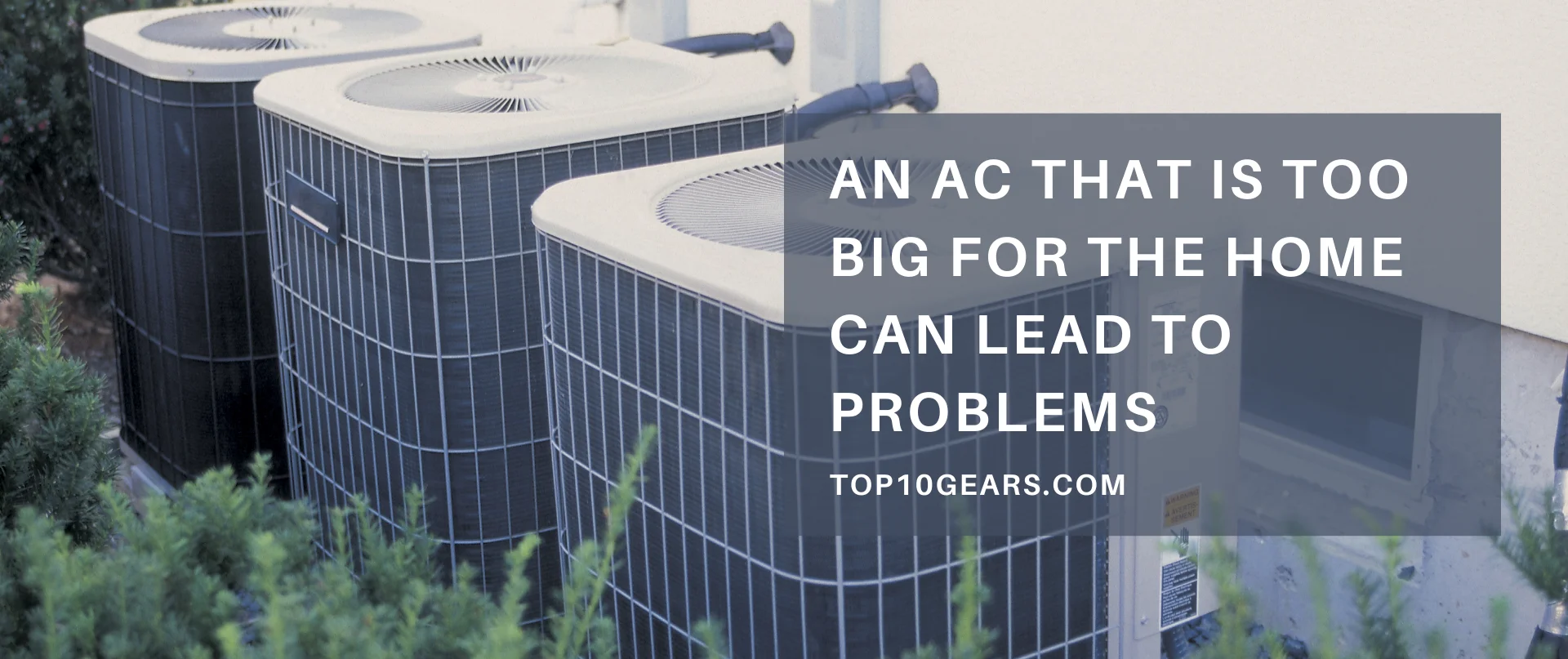
There are many reasons to not always go for the bigger unit than your requirement, and some key reasons are listed here.
Poor Air Quality & More Humidity
The oversized air conditioners trip very fast and do not run for a longer period, and this results in an increased amount of humidity in the surroundings.
Humidity can lead to further problems like computer or furniture damage, and it even promotes the spread of dangerous viruses and bacteria, resulting in poor air quality.
High Purchase Price & Maintenance
Definitely, a bigger unit will cost you more, and it will have more maintenance as compared to a smaller unit. Moreover, when you buy an AC of big Tonnage, the unit is more likely to get faulty, and you are going to pay more for the maintenance every now and then.
Low Life of the Unit
Putting a big unit where a smaller unit is required may result in wear and tear of the parts more often, and hence it will drastically reduce the lifespan of the unit.
Even if you repair it every time, it won’t work properly and won’t produce the cooling you need for your surroundings. If your unit has a life of 15 years, it will drop down to 8-10 years only.
Higher Electricity Bills
If you put a bigger unit in work in place of a smaller unit, you are going to pay more electricity bills for sure. The big unit will draw more power and still won’t help you much with the cooling.
So, it is better that you buy the perfect unit as per your requirement to cool down the surroundings without paying extra money.
Noisy Conditions
The bigger the unit in a small place, the more noise it will produce throughout its running time. If you have installed that unit in your workplace or any other place where you work, you will not be able to focus on your work due to excessive noise.
Even at home, it will create a lot of noise, and you will find it difficult to sleep properly.
Read More: 10 Awesome Benefits of Air Conditioners to Keep you Safe
Factors that impact the Tonnage of an AC unit you need
Some basic factors that help you in choosing the right kind of AC tonnage are explained below.
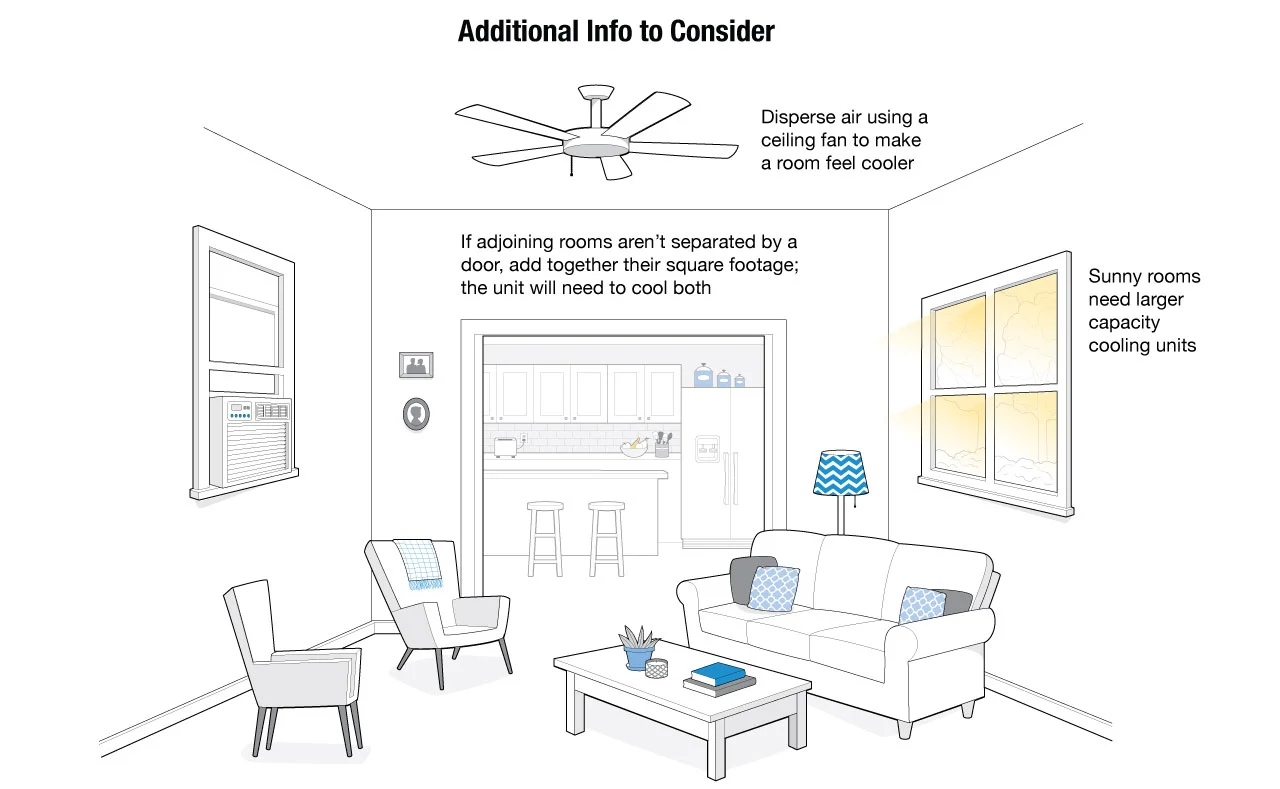
Size of the Room
An air conditioner removes the heat and humidity from a room or an enclosed space. A bigger space contains more heat and requires a high-capacity AC to cool the room efficiently.
The bigger the room, the higher the tonnage required to cool it effectively.
The size of the room is one of the most critical factors that impact the Tonnage of an AC unit. The area of the space is required to calculate the recommended base air conditioner capacity.
Height of Room
The height of a room increases the volume of the space that needs to be cooled. If the height of the ceiling is higher than 8 feet, it becomes an essential factor and should be accounted for.
To compensate for the increased volume of the room, we need to add additional capacity in proportion. Generally, for each foot over 8 feet, we need to add 1000 BTU/hr.
Number of People or Occupants

We all know that the human body releases a lot of heat into the environment due to its metabolic rate. The heat release also depends on the activity level of an individual and may rise significantly during exercise.
Thus higher the number of an occupant in a space more is the heat load, and thus more Tonnage is required to cool the space.
Generally, 1 to 2 people in a room are normal, and for each additional person, we need to increase the AC capacity by 600 BTU/Hr.
Exposure to Kitchen Area

The presence of the Kitchen area is a vital factor in calculating the Tonnage of an air conditioner. Therefore, if you plan to install the air conditioner in a kitchen or a room adjacent to the kitchen or in a hall with an open kitchen, or any other area with a working kitchen, you need to compensate for the heat released from the kitchen.
Cooking releases lots of heat to the surroundings and increases the heat load of space. Therefore, we recommend you add 4000 BTU/hr to the base air conditioner capacity of an AC unit.
Exposure to the Sun

If you are on the top floor or any wall is directly facing the sun, i.e., the room or space you need to cool is exposed to a lot of heat coming from the sun, you will need a stronger air conditioner. To compensate for this exposure to the sun, we need to increase the AC’s capacity by 10%.
On the other hand, if the room is shaded for most of the day or faces away from the sun, we need to decrease the AC’s capacity by 10%.
Number of Windows

More windows in a room will lead to more sunlight and increase the heat load of the space. Therefore, this factor is also considered while calculating AC tonnage and needs to be compensated for.
A single window and a door in a room are normal, but if the room has more than one window facing east, it should be compensated by adding 1000 BTU/hr to the base air conditioner capacity of the unit.
Existing Insulation
The existing insulation will also impact the size of the AC you need in your room. Generally, newly constructed homes are insulated to protect from heat and help you in keeping room temperature normal, but old houses were not insulated, and this is why they require bigger AC units.
Location
Suppose you live in a place that is humid and hot most of the time. Houses in colder regions require smaller units, and houses in hot regions require big AC units.
The location also implies the amount of heat you get in your room. For instance, if your room is east or west facing, it will grab more heat than north or south-facing rooms.
All these factors impact the heat load of a room or space, thereby affecting the AC tonnage or the needed capacity of an air conditioner. In addition, it can also impact the monthly electricity bill and the cost of owning an air conditioner.
AC Tonnage Calculation Formula
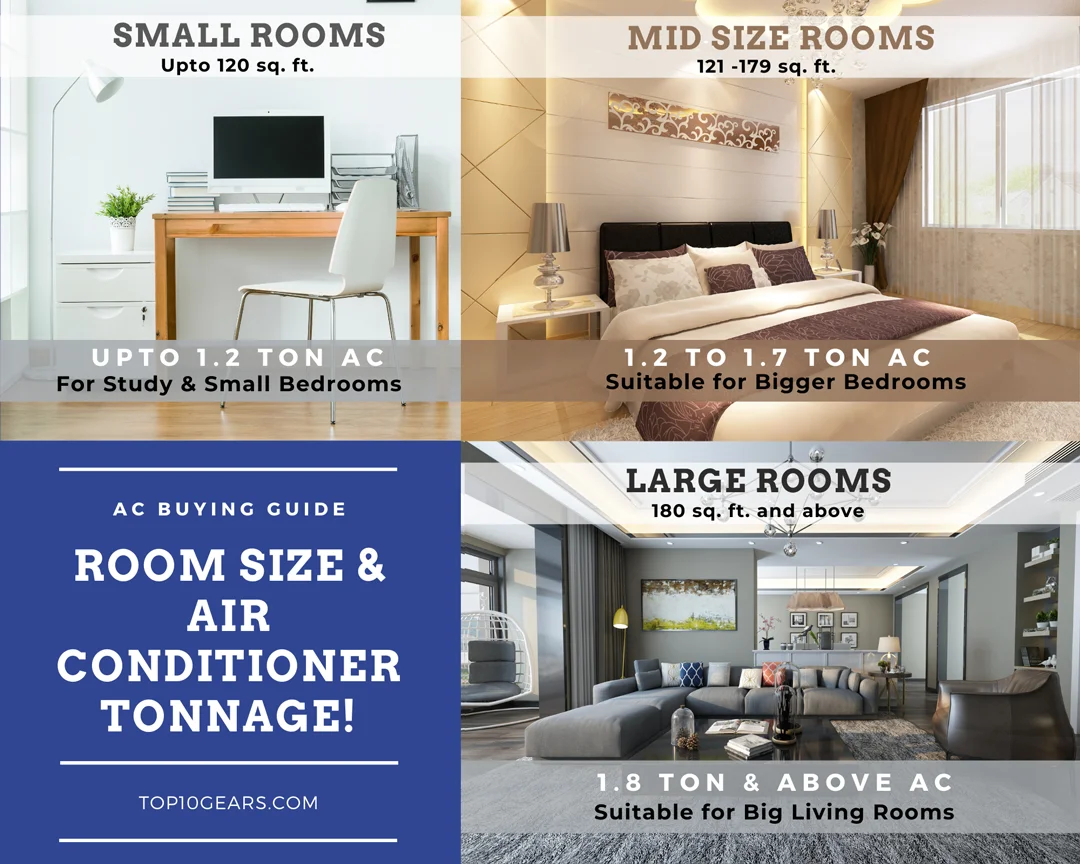
There are multiple formulae for calculating the AC capacity of a room. If you search for the AC tonnage calculation Formula on the internet, you will get plenty of methods that might confuse you. When I was planning to upgrade my cooling system, I also got confused.
After that, I took the help of one of my engineering friends, and he advised me to use the below formula to calculate the base air conditioner capacity
Length, Width, and Height are the dimension of a room or space in which you are planning to install an air conditioner and that you need to cool. These dimensions should be in feet. We have used this formula in our above AC tonnage Calculator.
Apart from the above-mentioned AC tonnage calculator formula, there are other methods also to determine the base AC capacity for your room.
Area Method
The area method is quite easy to use. You have to multiply the length and breadth of the room, which is in feet, take the square root of that number and then divide the value by 10. The result will be your Tonnage.
Example: Length= 15 feet long, Width= 10 feet wide
Area = 15*10 = 150 sq. ft
AC Tonnage = (150/100) = 1.5
Choose an AC of 1.5 Tons
Volume Method
Here, in the volume method, you have to multiply the length, breadth, and height of the room and then divide the resulting answer by 1000. You will get your AC tonnage.
Example: Length= 20 feet long, Width= 15 feet wide, Ceiling Height = 9 feet high
Volume= 20*15*9= 2700 cu. feet
AC Tonnage= (2700/1000) = 2.70 ≈ 3
Choose an AC of 3 Tonnage
AC Tonnage Chart Method
In the AC tonnage chart method, first of all, you need to calculate the area of your room by multiplying the length and width of the room in feet.
After that, check the below AC tonnage chart for its corresponding base AC capacity in BTU and Tons
| Room Area (sq. ft) | AC capacity in BTU | AC Tonnage |
| 100-150 | 5000 | 0.50 Tons |
| 150-250 | 6000 | 0.50 Tons |
| 250-300 | 7000 | 0.50 Tons |
| 300-350 | 8000 | 0.75 Tons |
| 350-400 | 9000 | 0.75 Tons |
| 400-450 | 10000 | 0.75 Tons |
| 450-550 | 12000 | 1.00 tons |
| 550-700 | 14000 | 1.00 tons |
| 700-1000 | 18000 | 1.50 Ton |
| 1000-1200 | 21000 | 1.50 Ton |
| 1200-1400 | 23000 | 2.00 Ton |
| 1400-1500 | 24000 | 2.00 Ton |
| 1500-1800 | 30000 | 3.00 Ton |
| 1800-2000 | 36000 | 3.00 Ton |
| 2000-2200 | 39000 | 3.00 Ton |
| 2200-2400 | 42000 | 3.50 Ton |
| 2400-2700 | 48000 | 4.00 Ton |
| 2700-3000 | 54000 | 4.50 Ton |
| 3000-3300 | 60000 | 5.00 Ton |
| 3300-3600 | 66000 | 5.50 Ton |
| 3600-3900 | 72000 | 6.00 Ton |
While buying an AC unit, you also need to look into other influencing factors like the Number of People or Occupants, Exposure to the Kitchen Area, Number of Windows, Exposure to the Sun, and existing insulation, etc.
How to Calculate AC Tonnage of a Room: Stepwise Guide

A helpful stepwise guide is also easy to follow and convenient for calculating the Tonnage. Calculating the AC Tonnage can be broken down into nine different steps that you can follow to get the right size of an air conditioner.
If it is triangle-shaped or odd-shaped with a combination of other shapes, you need to rely on the basic principles we learned in our geometry class.
It is not the final AC tonnage, and we need to compensate for other influencing factors too.
For each additional person, we need to increase the base AC capacity by 600 BTU/hr or add it to the BTU value from Step 3.
For adjusting the exposure to the kitchen area, we need to add 4000 BTU/Hr to the BTU value from step 4.
The electrical and electronic appliances produce heat and need to be compensated for.
If the space is shady due to the tree or shadow of other buildings, then we need to decrease the AC’s capacity by 10%.
Frequently Asked Questions
Our Recommendations
Table could not be displayed.Final Verdict
The AC tonnage is a crucial factor in determining the unit’s exact size for your surroundings. It helps you by boosting performance, providing more cooling, and saving expenses after purchase. So, you can use the methods mentioned above to determine the AC tonnage or use our AC Tonnage Calculator tool above.
But before making any purchase, always check the exact requirement for your room or surroundings. You can also take the help of a professional technician.
If you are planning to buy an air conditioner for your room, you can check our comprehensive AC Buying Guide. In the article, we have given you all the factors that you should consider, all the steps that you should follow, and all the important parts of an AC and its working. The article also contains all the terminology that you should know while buying an air conditioner.
If you’ve found this post informative, then share it with your friends and family. If you feel that we have left anything or made any mistakes, please tell us in the comments section below. We’ll update the article as soon as possible!
User Rating: ( vote)


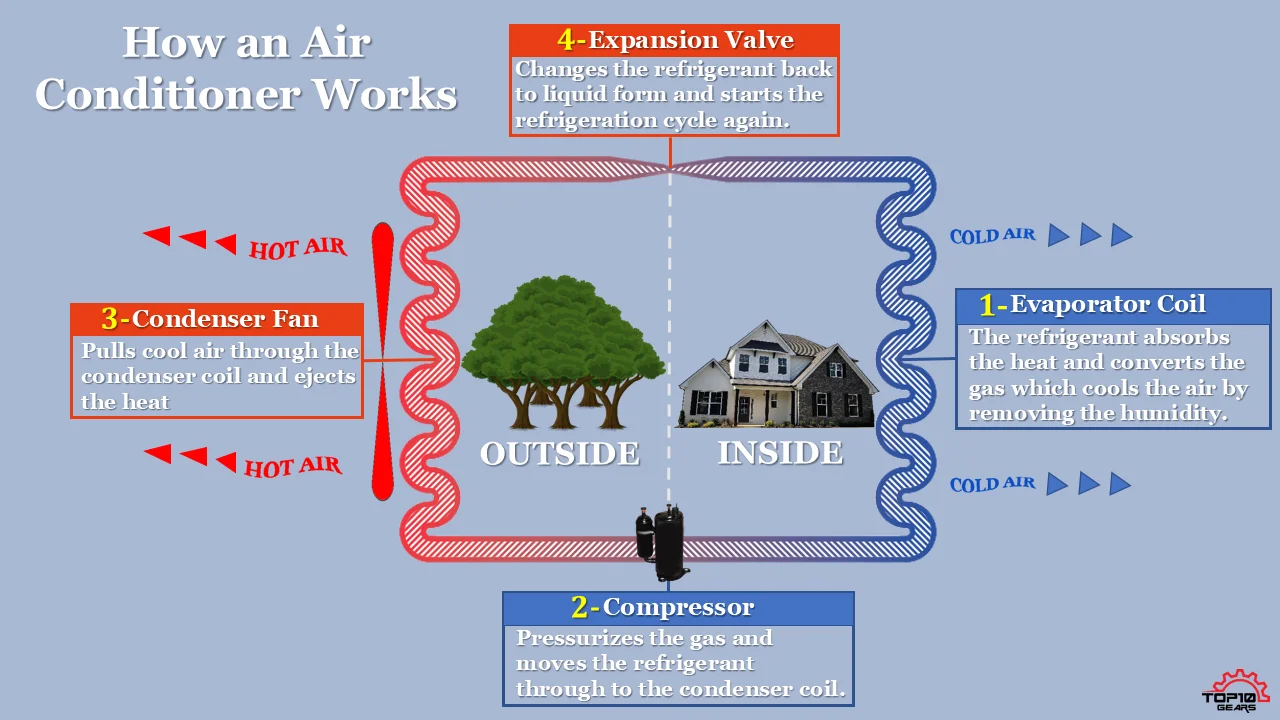
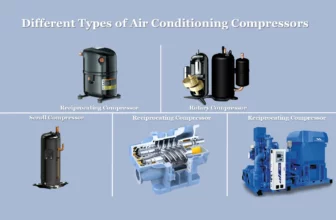





Simple and very easy to understand the calculation methods